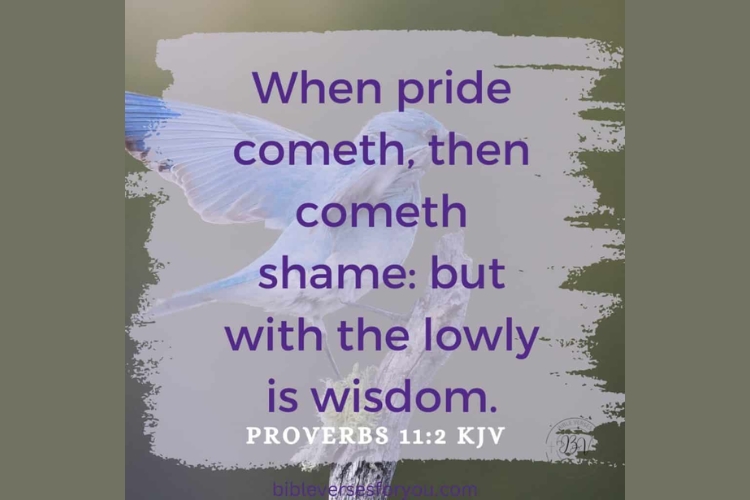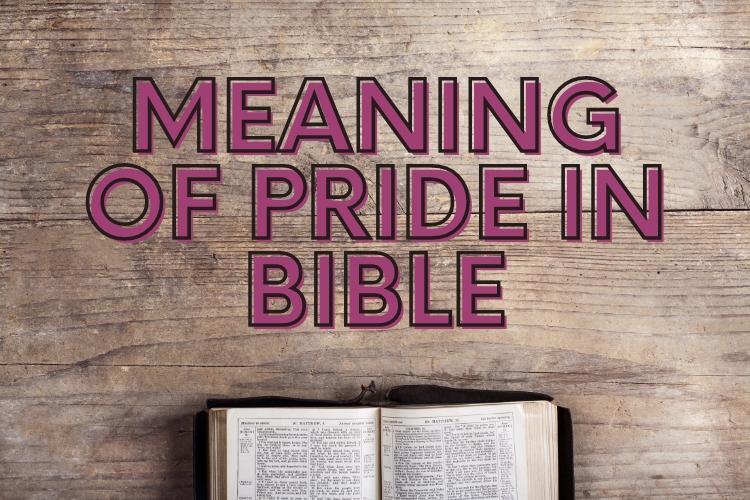What is the meaning of pride in the bible? The concept of pride in the Bible is multifaceted, encompassing both positive and negative aspects. While it can represent the majesty of God or the dignity of a nation, it is more frequently addressed as a dangerous, sinful attitude of arrogance and self-reliance.
In this blog post guide, we will explore the biblical perspective on pride, its implications, and the guidance provided for living a life free from the pernicious effects of pride.
Key Takeaways
- In the Old Testament, pride is often seen negatively, associated with stubbornness, arrogance, and a shift from reliance on God to self-reliance.
- Wisdom literature contrasts the proud with the righteous, emphasizing the dangers of pride and advocating for humility and reliance on God’s wisdom.
- The New Testament transforms the concept of pride, presenting humility as the antidote and highlighting the downfall that comes from prideful behavior.
- Pride is depicted as a root cause of human conflict and separation from God, and overcoming it requires spiritual discipline and seeking God earnestly.
- Practical applications within the Bible suggest ways to identify and address pride, the importance of community in mitigating it, and teachings on humility in leadership.
The Old Testament Perspective on Pride

Positive Aspects of Pride in Israel’s History
In the Old Testament, the concept of pride is not exclusively negative. There are instances where pride is portrayed in a positive light, particularly when it pertains to the nation of Israel or the majesty of God. For example, the “pride” of the land of Israel is celebrated as a testament to God’s blessing and favor.
- Psalm 47:4 highlights the pride associated with the chosen land.
- Ezekiel 24:21 refers to the pride in the temple as God’s dwelling place.
- Expressions of God’s “pride/majesty/excellency” are found in passages like Exodus 15:7 and Isaiah 2:10, where the focus is on His supreme power and glory.
While the negative aspects of pride are more frequently mentioned, these positive references serve as reminders of the rightful pride in God’s provision and the identity of Israel as His people.
The Predominance of Negative Connotations
In the Old Testament, pride is frequently depicted as a perilous attribute, often leading individuals away from the path of righteousness. The Bible characterizes pride as the root of various evils, suggesting a strong link between pride and moral downfall.
This negative portrayal is consistent across numerous passages, where pride is associated with arrogance, self-exaltation, and a lack of humility before God.
- Pride leads to a critical spirit and negative judgment of others.
- It fosters feelings of jealousy and envy towards the successful.
- Pride can manifest in a sense of superiority based on possessions, abilities, or status.
The biblical narrative warns that pride goes before destruction and a haughty spirit before a fall, emphasizing the inherent dangers of prideful behavior. The Old Testament stories and laws serve as a cautionary tale, urging believers to eschew pride and embrace humility.
Characteristics of Sinful Pride
In the biblical context, sinful pride is often depicted as a destructive force. It is characterized by an inflated self-view and a disdainful attitude towards others. Sinful pride is not merely confidence or satisfaction in one’s achievements; it is an excessive preoccupation with self that stands in opposition to the humility that God values.
- Arrogance: A sense of superiority over others.
- Haughtiness: Displaying contempt for those deemed inferior.
- Insolence: Showing a rude and arrogant lack of respect.
- Self-reliance: An overconfidence in one’s own abilities, often dismissing the need for God.
Sinful pride can be a subtle foe, masquerading as self-assuredness while quietly corrupting one’s character and relationships. It is a state of heart that blinds individuals to their need for God and leads them to rely solely on themselves.
The Bible warns against such attitudes, emphasizing that pride goes before destruction and a haughty spirit before a fall (Proverbs 16:18). Recognizing these characteristics is the first step in addressing the sin of pride and seeking a heart aligned with God’s will.
The Dangers of Pride According to Wisdom Literature

The Contrast Between the Proud and the Righteous
In the Wisdom literature of the Bible, a clear delineation is made between the proud and the righteous. The proud are often characterized by an inflated self-view and contempt for others, while the righteous exhibit humility and a reliance on God rather than on themselves.
This contrast is not merely about attitudes but is reflected in the behaviors and outcomes of individuals.
- The proud are described with terms such as insolent, arrogant, and self-reliant.
- The righteous, on the other hand, are those who walk in humility and seek wisdom from God.
The proud person shifts confidence from God to self, embodying an attitude that God opposes.
The Bible consistently warns of the dangers of pride, emphasizing that it is a barrier to a relationship with God. It is the humble, those who clothe themselves with humility toward one another, who receive grace. The proud, conversely, face opposition from God, as they are too consumed with their own status to seek Him.
Pride as a Reflection of Self-Reliance
In the biblical context, pride is often equated with a false sense of self-reliance. This self-reliance is not about the healthy independence of making one’s own decisions, but rather a deep-seated belief in one’s own abilities to the exclusion of God’s guidance and wisdom.
It is a form of self-deception, where individuals believe they are the sole architects of their success.
- Pride disguises itself as self-sufficiency, leading individuals to reject divine assistance.
- It manifests in a reluctance to acknowledge one’s limitations and need for God.
- The Bible warns that such pride precedes a fall, as it blinds one to the reality of human frailty.
The illusion of self-sufficiency is a subtle trap that ensnares many. It is a quiet rebellion against the sovereignty of God, where one’s own judgment is placed above divine insight.
The Scriptures consistently remind us that true wisdom and strength come from a humble reliance on God, not from the fortress of personal pride. Recognizing this is the first step towards a life aligned with spiritual truth.
Consequences for the Proud in Proverbs
The book of Proverbs in the Old Testament is replete with warnings about the perils of pride. Proverbs 16:18 starkly reminds us that pride is a precursor to disaster, stating, “Pride goes before destruction, a haughty spirit before a fall.” This proverb encapsulates the biblical view that pride is not merely an undesirable trait but a dangerous one.
The consequences of pride are consistently negative, leading individuals away from wisdom and towards disgrace. Consider the following verses from Proverbs:
- Proverbs 11:2: “When pride comes, then comes disgrace…”
- Proverbs 15:33: “…humility comes before honor.”
- Proverbs 18:12: “Before his downfall a man’s heart is proud…”
- Proverbs 29:23: “A man’s pride brings him low…”
Each of these verses links pride with negative outcomes, such as disgrace, downfall, and being brought low. The pattern is clear: pride is a destructive force that precedes a fall, both metaphorically and literally.
The consistent message is that pride leads to a disconnection from the wisdom and guidance of God. It is a state of self-reliance that blinds individuals to their need for divine direction and the support of a community.
New Testament Teachings on Pride

The Transformation of Pride in Christian Thought
In the New Testament, the concept of pride undergoes a significant transformation. Pride is no longer seen as a potential virtue but as a vice that stands in opposition to the teachings of Christ.
The secular re-definition and re-evaluation of pride, as seen in the works of philosophers like Hume, further distanced the concept from its traditional Christian understanding.
- Pride is depicted as a hindrance to spiritual growth and a barrier to grace.
- Humility is elevated as the ideal state of the Christian heart.
- The focus shifts from human achievement to divine grace as the source of true worth.
The Christian journey involves a continuous struggle against pride, with an emphasis on humility and reliance on God’s grace for both salvation and sanctification.
Conversion to Christianity is not a safeguard against pride; even the Apostle Paul grappled with it. The New Testament narrative encourages believers to recognize their dependence on God, not only for salvation but also for ongoing spiritual development.
Examples of Pride Leading to Downfall
In the biblical narrative, pride is often the precursor to a great fall.
The story of Nebuchadnezzar serves as a stark warning, where his self-exaltation led to a period of madness and humiliation until he recognized the sovereignty of God (Daniel 4:28-37). Similarly, King Uzziah’s prideful tampering with the temple rites resulted in his leprosy and downfall (2 Chronicles 26:16-21).
The path of pride is marked by a series of escalating consequences, from internal strife to ultimate destruction.
The consequences of pride are consistently severe, as outlined in various scriptures:
- Contention and strife become prevalent, as pride breeds quarrels (Proverbs 13:10).
- Shame and disgrace follow, as pride comes before a fall (Proverbs 11:2).
- Separation from God, since a prideful heart does not seek Him (Psalm 10:4).
- Ultimately, destruction looms, as pride goes before destruction (Proverbs 16:18).
These examples underscore the gravity of pride and its ability to precipitate one’s downfall, both spiritually and temporally.
Humility as the Antidote to Pride
In the biblical narrative, humility is consistently presented as the antidote to pride. This virtue is not about self-deprecation but about recognizing one’s proper place in relation to God and others. It involves a truthful assessment of oneself, acknowledging both strengths and limitations without exaggeration.
The Scriptures provide clear guidance on the transformative power of humility:
- Humility is critical to receiving God’s grace.
- It precedes honor and is necessary for wisdom.
- Humility is about truthfulness, not denial of one’s abilities or contributions.
By embracing humility, we align ourselves with God’s design, allowing His grace to flow into our lives. It is the pathway to true honor and wisdom, as opposed to the false and fleeting exaltation that comes from pride.
To rid oneself of pride, a proactive approach is recommended:
- Seek divine illumination to recognize pride.
- Request honest feedback from others.
- Cultivate a humble attitude as the foundation for spiritual growth.
The paradoxical principle that the ‘way up is the way down’ is central to Christian teaching. By lowering ourselves, we are lifted up in the eyes of God, which contrasts sharply with the world’s view of self-exaltation.
Pride’s Role in Human Conflict and Separation from God

Pride as a Barrier to Seeking God
In the spiritual journey, pride acts as a formidable barrier to seeking God. It manifests as a self-imposed elevation above divine wisdom, leading individuals to rely on their own understanding rather than seeking guidance from the Almighty. This self-reliance obscures the need for God’s intervention and wisdom in our lives.
- Pride fosters a false sense of independence, suggesting that one’s abilities are sufficient without divine support.
- It blinds individuals to their own limitations and the necessity of God’s grace.
- By prioritizing self over the Creator, pride hinders a true relationship with God, which is founded on humility and recognition of our dependence on Him.
The insidious nature of pride lies in its ability to disguise itself as confidence while subtly undermining our reliance on God. It is a silent whisper that encourages us to turn inward rather than upward, leading to a path of isolation rather than communion with the divine.
The Bible warns against the dangers of pride, emphasizing that it not only separates us from God but also from the community of believers.
It is a common thread in human conflict, often at the heart of disputes and divisions. To overcome this barrier, one must cultivate a spirit of humility, recognizing that all strengths are gifts from God and that seeking His will is paramount.
The Relationship Between Pride and Other Sins
In the biblical narrative, pride is often depicted as the root of various other sins. It is the kind of pride that stems from an inflated self-view and a disdain for others that intertwines with numerous negative behaviors and attitudes.
For instance, pride can lead to jealousy when one perceives another as a threat to their superiority. It can also foster anger when one’s inflated ego is challenged or slighted.
- Jealousy: Pride can cause us to envy the achievements or possessions of others.
- Anger: A proud heart may react with anger when its perceived status is threatened.
- Disobedience: Pride can make us reject authority or divine command, believing we know better.
- Dishonesty: To maintain an image of superiority, a proud person might resort to lies or deceit.
Pride’s insidious nature means it can be a catalyst for a cascade of other sins, each stemming from the initial sin of pride and leading to further spiritual decay.
The Bible warns that pride goes before destruction, and an arrogant spirit before a fall (Proverbs 16:18). This proverb encapsulates the danger of pride as it not only leads to other sins but also sets one on a path towards personal ruin.
Overcoming Pride Through Spiritual Discipline
Overcoming pride requires a commitment to spiritual discipline, a process that involves both internal reflection and external actions.
Spiritual disciplines are practices that foster spiritual growth and help individuals to humble themselves before God. These disciplines can take many forms, from prayer and meditation to fasting and service to others.
- Give God the credit for your achievements, recognizing that all good things come from Him.
- Recognize God’s gifts in your life, acknowledging that your talents and opportunities are blessings.
- Depend on God’s providence, trusting in His plan and timing rather than your own understanding.
- Cherish the gospel, letting it shape your identity and purpose.
- Serve others selflessly, putting their needs above your own.
- Know true greatness comes from serving, not being served.
The journey to humility is a continuous one, marked by daily choices to put away pride and embrace a posture of dependence on God. It is not a battle won in a day, but a war waged over a lifetime.
By engaging in these practices, individuals can cultivate a heart of humility, which is essential for overcoming pride. It is also important to be vigilant, as pride can easily resurface. Seeking accountability from friends and confessing sins of pride can help maintain a humble spirit.
Practical Applications: Living a Life Free of Pride

Identifying and Addressing Pride in Personal Behavior
Recognizing pride within ourselves can be challenging, as it often masquerades as self-confidence or assertiveness. It is essential to discern the fine line between healthy self-esteem and sinful pride. To address pride, we must first identify its manifestations in our behavior and attitudes.
- Reflect on your motivations and the true intentions behind your actions.
- Consider how you view and treat others, especially those you may perceive as less successful or important.
- Seek feedback from trusted friends or mentors who can provide an honest assessment of your behavior.
It is not merely our actions that matter but the heart behind them. As Proverbs 16:2 suggests, our ways may seem innocent, but it is the motives that are weighed by the Lord.
By examining our hearts and motives, we can begin to uncover the often subtle fruits of pride. This self-examination requires humility and a willingness to change, not just outwardly but at the core of our being.
The Role of Community in Mitigating Pride
In the journey to live a life free of pride, the community plays a pivotal role. The collective wisdom and accountability found within a community can be instrumental in identifying and addressing pride. Members can give each other permission to point out prideful behavior, fostering an environment of mutual growth and humility.
- Encourage open dialogue about pride and its manifestations
- Offer support when individuals struggle with pride
- Celebrate acts of humility and service
The community acts as a mirror, reflecting back to us the areas where pride may be deceiving our minds and hindering our spiritual progress.
By focusing more on God and less on ourselves, we can leverage the strength of the community to overcome the challenges of pride. The community’s role is not to judge but to guide, providing a balanced perspective that aligns with spiritual teachings.
Teachings on Pride and Leadership in the Church
In the context of church leadership, pride can be particularly insidious, as it can distort the purpose of service and lead to a fall from grace.
Leaders are called to model humility, reflecting the servant leadership exemplified by Jesus Christ. Pride in leadership can manifest as a desire for power, recognition, or control, rather than a heart for service.
- Leaders must be vigilant against pride, constantly checking their motives.
- Accountability structures within the church can help prevent prideful leadership.
- Regular self-examination and community feedback are essential for leaders to remain humble.
The true measure of a leader in the church is not the extent of their authority, but the depth of their service and humility. Leaders are stewards of their roles, and pride can corrupt the stewardship entrusted to them.
The Bible’s teachings on pride serve as a cautionary reminder for leaders to prioritize the well-being of their congregation over personal ambition. By fostering a culture of humility, church leaders can create an environment where pride is not only addressed but actively discouraged.
Conclusion:
In conclusion, the Bible presents a nuanced view of pride, distinguishing between a healthy sense of self-worth and the sinful arrogance that leads one away from God.
While pride in one’s achievements or in the accomplishments of loved ones can be positive, the Bible predominantly warns against the kind of pride characterized by self-righteousness, conceit, and an inflated view of oneself.
This negative form of pride is seen as a barrier to seeking God, fostering contempt for others, and relying on one’s own wisdom rather than divine guidance. Ultimately, the biblical perspective teaches us that true wisdom and righteousness come from humility and placing our trust in God above all else.
FAQ:
What is the biblical definition of pride?
In the Bible, pride is often depicted as a sinful, arrogant, and self-reliant attitude that causes a person to have an inflated view of themselves. It is different from taking pride in one’s accomplishments or expressing pride over the achievements of loved ones.
How does the Old Testament view pride?
While there are instances where pride is used positively in the Old Testament, such as the pride of the land of Israel or God’s majesty, the predominant view is negative. It often conveys arrogance, stubbornness, and self-reliance that are contrary to God’s will.
What does the Bible say about the dangers of pride?
The Bible warns that pride is a hindrance to seeking God and can lead to downfall. It is considered the root of many problems, including conflict and separation from God, and is associated with negative traits like conceit and arrogance.
How is pride contrasted with humility in the Bible?
Pride is often contrasted with humility in the Bible, with the latter being seen as the antidote to pride. Humility involves recognizing one’s dependence on God and valuing others, while pride involves self-reliance and an inflated self-image.
What are the consequences of pride according to the Book of Proverbs?
The Book of Proverbs outlines several consequences for the proud, including dishonor, strife, and downfall. It emphasizes that pride comes before destruction and highlights the importance of humility.
How can one overcome pride according to biblical teachings?
Overcoming pride according to biblical teachings involves spiritual discipline, such as prayer and meditation on God’s Word. It requires acknowledging one’s limitations and the need for God’s guidance, as well as fostering a community that supports humility and service.


